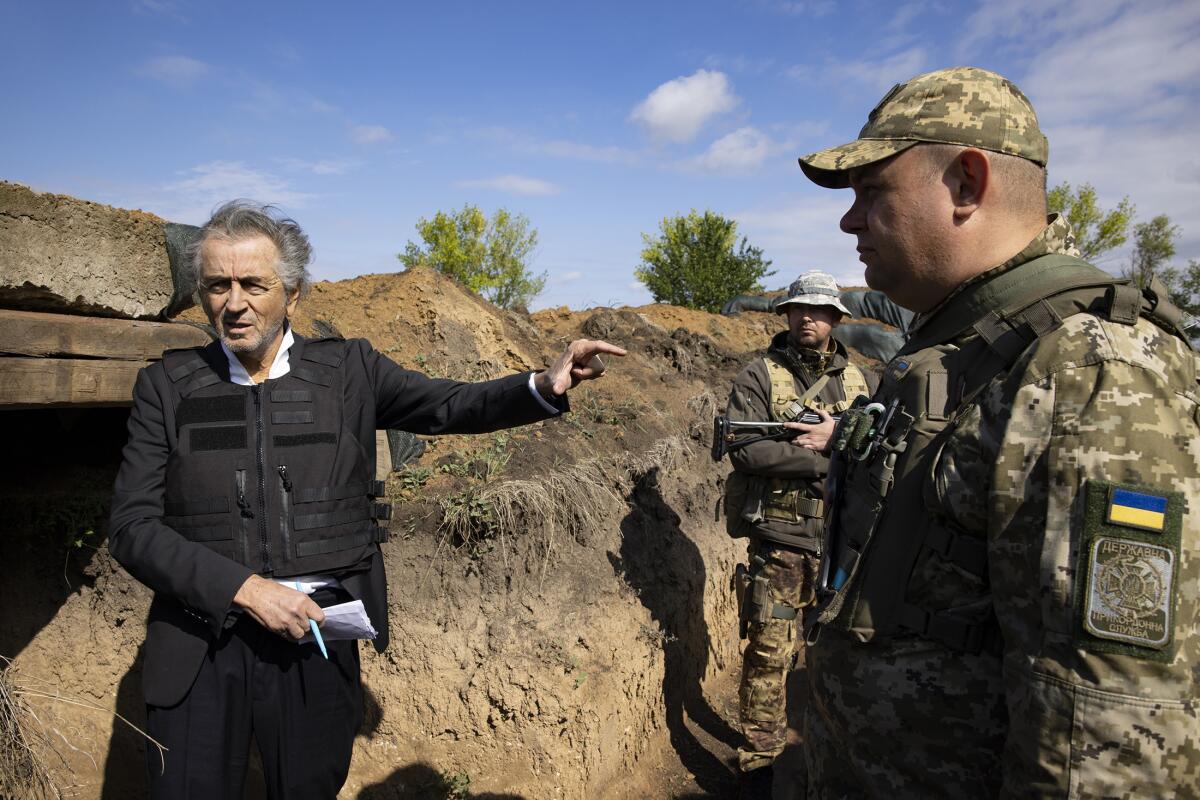Review: Bernard-Henri Lévy shows the fight for survival from the trenches in ‘Slava Ukraini’

- Share via
French intellectual and media personality Bernard-Henri Lévy, who rose to prominence with the anti-socialist New Philosophers movement in the 1970s, has never stopped thinking about civilization’s perilous situation around the world. But he’s also made it his calling to go to those places, welding concrete experience to his message of humanitarian action against totalitarianism.
For a while now, he’s been going with cameras, too, making documentaries (the globe-trotting 2021 film “The Will to See,” his 2016 movie about the Kurdish military “Peshmerga”) that marry his oft-ridiculed air of camera-ready, high-brow brooding with real glimpses into lives on the front lines of survival. Of late, it’s been Russia’s invasion of Ukraine, and that ongoing war’s consequences for geopolitical stability, that has stirred his need to bear witness, so much so that as soon as he finished a one-hour film for French television in the spring of last year, “Pourquoi l’Ukraine” (“Why Ukraine”), he went right back with frequent co-director Marc Roussel to keep filming with the country’s embedded forces. The resulting project, intended to mark the first anniversary of the war, is a conflict journal called “Slava Ukraini” (translated from the Ukrainian as “Glory to Ukraine”).
Starting in Kyiv, making his way to the heart of the counteroffensive in southern Ukraine, and ending with a tour of the liberated port city of Kherson last fall, Lévy gives us a travelogue of desolation, determination and grit, from shelled buildings and village evacuations to working coal mines and spirited military confabs. He takes us inside trenches at the front, where morale is high and borscht is ever-simmering, but also into departing Russian forces’ abandoned torture rooms. He visits Uman, home to the tomb of one of his idol’s — Jewish thinker Rabbi Nachman — and where a synagogue sheltered people in the war’s first days. Lévy also follows a unit acting on strategic information left on an “I want to live” hotline meant for deserting Russian soldiers.
Whether you see Lévy, a spritely 74, as a hot spot gadfly or a dedicated war reporter, there’s no denying his dedication to the cause. Eager to get as close to the combat as he can in his bulletproof-vested pinstriped suit — save the moment the spotting of a Russian drone signals a quick exit — he’s bringing to us aspects of the Ukrainian’s fight that illuminate the citizens’ and soldiers’ resolve to win; at the same time, he’s boldly arguing for continued Western help in the form of aid and weapons.
Lévy has long followed Putin’s aggression against Ukraine, having spoken at the anti-Putin Maidan protests in 2014 and befriended Volodymyr Zelensky before his presidency. Frequently making literary and historical references in his lionizing of the Ukrainians’ bravery and resilience, he nevertheless sees the war as a last stand of sorts for a safe Europe. In the press notes accompanying the film, he writes, “The Ukrainians are our rampart.” Where he can make any Ukrainian he comes across in the film into a timeless hero in the eyes of the viewer, he valiantly tries, even if his heavy-handed, floridly intoned narration (“streets that stink of soiled blood”) is as often an arch distraction as it is an observant dispatch. Lévy’s in-the-moment interview style usually leaves something to be desired, too, the camera often treating him as the star of the exchange, rather than whomever he’s talking to.
But for the most part, the loosely assembled, explicitly partisan war diary that is “Slava Ukraini” is a reminder that on the ground, Ukrainians are in this to defeat their invaders, whatever it takes, with whatever’s available. You can call Lévy a dilettante who loves being every Ukrainian’s biggest champion, but in their eyes, he’s a friend with a voice, a camera and a reach, and therefore, one more asset that might help them win the war.
'Slava Ukraini'
In French, Ukrainian and English with English subtitles
Not rated
Running time: 1 hour, 34 minutes
Playing: Starts May 5, Landmark Westwood
More to Read
Only good movies
Get the Indie Focus newsletter, Mark Olsen's weekly guide to the world of cinema.
You may occasionally receive promotional content from the Los Angeles Times.










